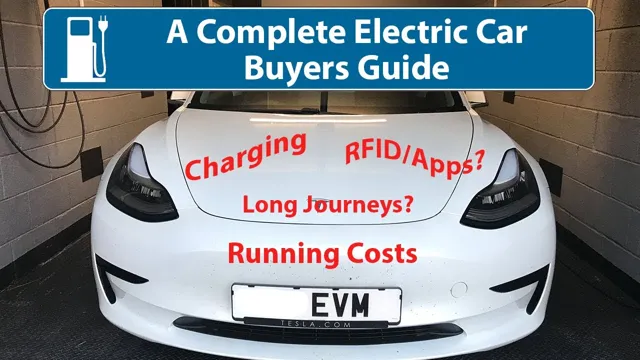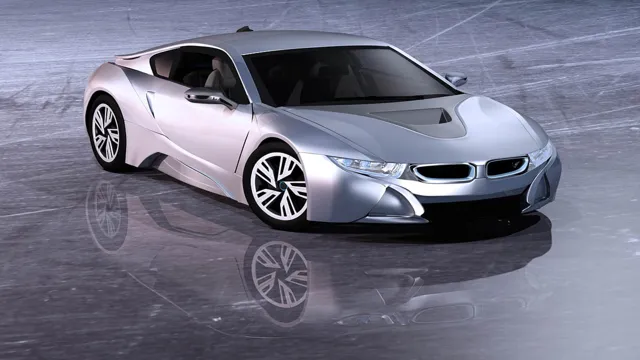The Ultimate Electric Cars Buyers Guide: Everything You Need to Know Before Making Your Purchase
Looking to purchase an electric car? With so many models and features available, choosing the right one for you can be an overwhelming task. That’s where this electric car buyer’s guide comes in. From range to charging options, safety features, and beyond, we’ve got you covered.
Whether you’re a first-time EV driver or a seasoned veteran, this guide will provide insight and recommendations to assist you in making the best decision for your needs. So why not take a closer look and make the switch to an eco-friendly, wallet-friendly electric car today?
Why go Electric?
If you’re considering purchasing a new car, the rapidly growing electric car market is worth your attention. Not only are electric cars better for the environment, emitting zero harmful emissions while driving, they also save you money on fuel costs in the long run. While the upfront cost may be higher than traditional gasoline-powered cars, you’ll end up saving substantially on fuel expenses over time.
Plus, many cities offer incentives for electric car buyers, such as tax credits or access to public charging stations. And don’t let concerns about limited battery range hold you back. The majority of electric cars can travel over 200 miles on one charge, which is more than enough for most daily commutes.
With a variety of models and features to choose from, there’s no doubt that electric cars are a smart investment for both the environment and your wallet. So why not make the switch to an electric car today?
Benefits of owning an electric car
Electric cars have become increasingly popular over the years, and for good reason. Owning an electric car comes with a multitude of benefits that not only benefit the environment, but the owner as well. Firstly, electric cars are incredibly cost-effective as they require significantly less maintenance than conventional cars.
This is because they have fewer moving parts, which means less wear and tear and less money spent on repairs. Furthermore, electric cars are much more efficient when it comes to fuel consumption. Because they run on electricity, they can be charged at home for a fraction of the cost of gasoline, making them an economical option for those looking to save money.
Additionally, electric cars are also eco-friendly as they emit zero emissions into the environment. By reducing carbon emissions, electric cars help to mitigate climate change and improve air quality. In conclusion, going electric is a smart and sustainable choice that benefits both the environment and the wallet.

Electric vs gas cars
Electric cars are a great alternative to gas cars for a few reasons. For one, they are better for the environment since they produce zero emissions. This means that they don’t pollute the air like gas cars do, which is especially important in cities and other areas with high levels of air pollution.
Additionally, electric cars can save you money in the long run since you don’t need to buy gas. Instead, you can simply charge your car at home or at a charging station. While the initial cost of an electric car may be higher than that of a gas car, you can often recoup those costs over time through the savings on fuel.
Overall, if you’re looking for a more eco-friendly and cost-effective option for your transportation needs, going electric might just be the way to go.
Choosing the right Electric Car
Electric cars have gained immense popularity in recent times due to their eco-friendliness and cost-effectiveness. If you’re considering purchasing one, there are several factors to consider. The first step is to determine your needs and budget.
Next, you’ll need to decide between a hybrid or fully electric car based on your driving habits and commuting distance. Also, consider the range of the vehicle, charging options, and incentives or tax credits available. It’s also essential to research the brand, model, and features to ensure you get the best value for your money.
With various manufacturers in the market and new models entering all the time, conducting thorough research and understanding your priorities will help you choose the right electric car to suit your lifestyle.
Types of electric cars available
When it comes to choosing the right electric car, there are several options available on the market. The most common types of electric cars are Battery Electric Vehicles (BEVs), Hybrid Electric Vehicles (HEVs), and Plug-in Hybrid Electric Vehicles (PHEVs). BEVs are fully electric cars that run solely on battery power and need to be charged regularly.
HEVs, on the other hand, are powered by a combination of an electric motor and a gasoline engine. PHEVs can run solely on electric power for shorter distances, but they also have a gasoline engine for longer trips. To choose the right electric car, it’s important to consider your driving habits, commuting distance, and the charging infrastructure in your area.
BEVs are ideal for those who have shorter commutes and access to charging stations, while PHEVs are better suited for those who frequently drive longer distances. HEVs are a good option for those who want to reduce their carbon footprint but aren’t ready to go fully electric yet. Ultimately, choosing the right electric car comes down to your individual needs and preferences.
By doing your research and test driving different models, you can find the perfect electric car for you.
Factors to consider before buying an electric car
When it comes to shopping for an electric car, there are several factors to take into consideration before making a decision. One of the most crucial considerations is choosing the right electric vehicle that would cater to your driving needs. Factors such as battery life, range, charging time, and the number of charging stations available nearby need to be taken into account before choosing the right EV.
Additionally, the size of the car, its performance, and its cost are also essential criteria in selecting the perfect electric car for you. It’s vital to do your research and narrow down your choices based on your preferences and driving habits. Keep in mind that going all-electric can be a significant change, but with the right EV, the benefits outweigh the challenges.
Ultimately, the goal is to choose an electric car that meets your needs while being environmentally conscious.
Popular electric car models
When it comes to choosing the right electric car, there are plenty of popular models to choose from. One of the most well-known is the Tesla Model S, known for its sleek design and impressive range capabilities. If you’re looking for something more affordable, the Nissan Leaf is a great option, with a surprisingly spacious interior and reliable performance.
The Chevy Bolt is another popular choice for its sporty handling and impressive range, while the Hyundai Kona Electric offers a fun driving experience and great value for the price. Ultimately, the key to choosing the right electric car is to consider your needs and priorities. Are you looking for something with a long range, or are you more concerned with affordability and practicality? Do you prioritize performance and handling, or are you more focused on comfort and convenience? By taking the time to consider your options and do your research, you can find the perfect electric car that meets your needs and fits your lifestyle.
Charging Your Electric Car
If you’re considering buying an electric car, it’s important to know how and where to charge it. There are a few different charging options available, from slow charging with a regular household outlet to fast charging stations found throughout many cities. The charging time will vary depending on the type of charger used, the capacity of your battery, and the driving distance you need to cover.
It’s also recommended to plan your routes in advance and locate charging stations along the way. Some newer models of electric cars have onboard navigation that will indicate where the nearest charging stations may be. Keep in mind that while many charging stations are free, some may require payment or a membership fee.
Overall, understanding the charging process is crucial to ensuring your electric car drives smoothly and efficiently.
Types of chargers and charging times
If you’re considering purchasing an electric car, understanding the different types of chargers and the charging times for each can be critical. There are three main types of chargers: Level 1, Level 2, and Level 3 (also known as DC fast charging). Level 1 is the slowest and most basic form of charging and can take up to 24 hours to fully charge an electric car.
Level 2 chargers are more powerful and can charge most electric cars in a matter of hours, with a typical charging time of 4 to 6 hours. Finally, Level 3 chargers are the fastest and can charge an electric car up to 80% in just 30 minutes, but they are much less common and can be more expensive to use. It’s essential to consider your driving needs and routine when deciding which charger type to install at home or where to locate public charging stations.
Level 1 chargers are suitable for those who don’t drive long distances often, while Level 2 or 3 chargers may be more beneficial for frequent road trippers or commuters with long daily driving commutes.
How to find charging stations
As electric cars become more popular, the demand for charging stations has increased. Finding a charging station may seem daunting at first, but there are now various ways to locate them. One way is to use the charging station locator on your car’s navigation system.
This tool allows you to search for charging stations within a specific radius of your current location. Another option is to use a mobile app, such as PlugShare or ChargePoint. These apps provide real-time data on charging station locations and availability.
In addition, many charging station networks, such as Tesla’s Supercharger network, have their own mobile apps that allow their customers to locate and access charging stations. With these tools and resources at your disposal, charging your electric car has never been easier.
Government Incentives & Rebates
If you’re looking to purchase an electric car, it’s important to be aware of the various incentives and rebates available from the government. Depending on where you live, there may be federal, state, or local programs that can significantly reduce the cost of your new vehicle. For example, the federal government offers a tax credit of up to $7,500 for electric cars, while some states offer additional rebates or exemptions from sales tax.
It’s worth doing your research to see what options are available in your area. In addition to financial incentives, some states also offer perks like access to HOV lanes and free parking for electric cars. These benefits can make driving an electric car even more appealing, particularly for those who commute long distances or spend a lot of time on the road.
All in all, taking advantage of government incentives and rebates can be a great way to save money and do your part for the environment. So if you’re considering buying an electric car, be sure to explore all your options and see what kind of deals you can get.
Available incentives and rebates
When it comes to purchasing an electric vehicle, one major advantage is the availability of government incentives and rebates. These incentives can vary depending on where you live, but they can make a significant impact on the overall cost of the vehicle. For example, in the United States, the federal government offers a tax credit of up to $7,500 for the purchase of a qualifying electric vehicle.
Additionally, some states offer their own incentives, such as rebates, tax credits, or even free charging stations. It’s important to research the specific incentives and rebates available in your area, as well as any eligibility requirements, to make sure you’re taking full advantage of the savings opportunities. Not only can these incentives make an electric vehicle more affordable, but they can also help reduce emissions and support a more sustainable future.
Conclusion
In conclusion, the world of electric cars is like a new frontier waiting to be explored. It’s an exciting time to be a car buyer, with a wide range of options to choose from and the ability to make a positive impact on the environment. So whether you’re looking for a sleek and sporty electric vehicle or a more practical family car, there is an electric car out there for everyone.
Go ahead and take the leap into the unknown and join the ranks of the eco-conscious electric car drivers. Who knows, you might just enjoy the ride. After all, life is too short to stick to the same old gas-guzzling routine.
“
FAQs
What is an electric car?
An electric car is a vehicle that runs on rechargeable batteries, rather than traditional gasoline or diesel fuel.
How do electric cars work?
Electric cars rely on an electric motor to power the vehicle. The motor is run by rechargeable batteries, which can be plugged in and charged overnight.
What are the benefits of owning an electric car?
Electric cars are more environmentally friendly than traditional cars, as they emit less pollution. They can also save you money on fuel costs, as electricity is cheaper than gasoline.
How far can an electric car go on a single charge?
The distance an electric car can travel on a single charge varies depending on the model. Some electric cars can travel up to 300 miles on a single charge, while others have a shorter range.



